Pete Sutton's Blog, page 35
March 5, 2015
The Kitschies

Last night was the award ceremony for the Kitschies & I was lucky to attend. The Kitschies celebrate - well I'll let Glen Mehn point to what they celebrate:

There were almost 200 books submitted to the award and the judges this year included Adam Roberts & Frances Hardinge. There were drinks consumed and friends greeted, new and old. All in all an excellent night. Many congratulations to all the winners & everyone on the shortlists.
There are 5 awards -
Red Tentacle
The Red Tentacle is awarded annually to the novel containing speculative or fantastic elements that best fulfills the criteria of intelligent, progressive and entertaining.
The winner of the Kitschies Red Tentacle for 2014 was Grasshopper Jungle, by Andrew Smith (Electric Monkey). Judge Kim Curran said, “We loved all the shortlist, and Grasshopper Jungle was, in the end, the novel with the biggest chance to actually blow a young person’s mind.”
The rest of the shortlist included:
Lagoon, by Nnedi Okorafor (Hodder & Stoughton)The Peripheral, by William Gibson (Viking)The Way Inn, by Will Wiles (4th Estate)The Race, by Nina Allan (NewCon Press)The Girl in the Road, by Monica Byrne (Blackfriars)Memory of Water, by Emmi Itäranta (HarperCollins)The Long Way to a Small, Angry Planet, by Becky Chambers (Self-Published)The People in the Trees, by Hanya Yanagihara (Atlantic Books)
Golden Tentacle
The Golden Tentacle is awarded annually to the debut novel that best fits the criteria of progressive, intelligent and entertaining. The book must be the author’s first published work of novel-length fiction in any genre.
The Golden Tentacle went to Viper Wine, by Hermione Eyre (Jonathan Cape). The judges noted the audacity and craft of the novel.The rest of the shortlist included:The Girl in the Road, by Monica Byrne (Blackfriars)Memory of Water, by Emmi Itäranta (HarperCollins)The Long Way to a Small, Angry Planet, by Becky Chambers (Self-Published)The People in the Trees, by Hanya Yanagihara (Atlantic Books)The Inky Tentacle
The Inky Tentacle is awarded to the year’s finest cover art, as selected by a panel of visual arts experts from wide range of disciplines.
The Inky Tentacle for cover art went to Tigerman, cover by Glenn O’Neill (William Heinemann)The rest of the shortlist included:The Ghost of the Mary Celeste, design by Steve Marking, lettering by Kimberly Glyder (Weidenfeld and Nicolson)A Man Lies Dreaming, cover by Ben Summers (Hodder and Stoughton)Through the Woods, cover by Emily Carroll and Sonja Chaghatzbanian (Faber and Faber)The Book of Strange New Things, cover by Rafaela Romaya and Yehring Tong (Canongate)The Invisible Tentacle
The Invisible Tentacle is for progressive, intelligent and entertaining fiction that is natively digital.
The first-ever Invisible Tentacle went to Kentucky Route Zero, Act III, by Cardboard Computer.
The rest of the shortlist included:echovirus12, created/curated by Jeff Noon @jeffnoon, Ed @3dgriffiths, James Knight @badbadpoet, violet sprite @gadgetgreen, Richard Biddle @littledeaths68, Mina Polen @polen, Uel Aramchek @ThePatanoiac, Graham Walsh @t_i_s_u, Vapour Vox @Wrong_Triangle80 Days, by Inkle StudiosSailor’s Dream, by SimogoThe Black Tentacle
The Black Tentacle is a special achievement award. It is handed out at the discretion of The Kitschies’ board, which is comprised of editors, authors, marketers and entrepreneurs.
The Black tentacle was won by Sarah Macintyre who sported a trademark hat as you can see in the photograph of Glen!
The award seems to go from strength to strength, looking forward to the 2015 runners already!
Published on March 05, 2015 05:59
Review of Dark Star by Oliver Langmead
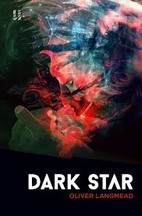
This is a debut from Langmead and wow what a debut. Dark Star combines hard boiled noir with sci fi in an epic poem. The Dark Star of the title burns black and the people of the city of Vox rely on 3 Hearts for power and to bring light. Virgil and Dante are cops out to find the killer of Vivian North whose body turns up shining brightly with un-natural light. They think it’s related to Prometheus, a street drug of liquid light, that Virgil himself is in thrall to but they are pulled ever further into a case that has deep and lasting ramifications for Vox and the world.
In school they try to teach you how to copeWith the constant dark, to tell you to find lightAnd avoid being immersed in blacknessThey fairly know what it does to a man
This is an unusual book, being, as it is, poetry, but that shouldn’t put you off, it is a remarkable read, and an easy one. Virgil is a hero for bringing in a serial killer, but he is scarred, both in body and deep inside by the experience. Dante is a cop with grit. The dark city is an eerie backdrop, filled with ghosts (literally) and shadow, a compelling setting richly invoked by the writing. There is a deft worldbuilding at work in here and a riveting story. Unsung Stories (the publisher of this and The Beauty - which I previously reviewed) are rapidly becoming a small press to watch.
Overall - Down these shadowed streets a flawed knight must seek to bring the light
Published on March 05, 2015 05:16
March 2, 2015
Candyfloss Guitar - Review
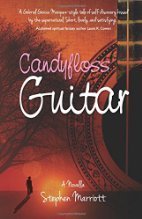
Stephen Marriott is a writer from Bristol, although he no longer lives here, so we at the Book Blog looked forward to this book's release. We managed to snag a copy ahead of the launch tonight - https://www.facebook.com/events/1550874145152856
"Candyfloss Guitar is a story about taking the first steps on a journey towards shrouded dreams and searching for meaning."
Eduardo is a candyfloss seller who laments the death of his wife and despairs that his son, Diego, will ever make anything of himself. When he hears Diego playing guitar in a bar he offers him a choice - go to work on a farm or make something from his dream of creating music. Eduardo gives his son his guitar and sets him on his way. Through a chance meeting Diego's footsteps take him on the Camino de Santiago (The Way of St James), a major Christian pilgrimage route. Of course the journey changes him through the people he meets.
This book can be read in an hour or so, it has a very engaging style and a cast of very memorable characters. Well worth checking out. I'd like to read more by Marriott.
Overall - It's a short book with a big heart.
Published on March 02, 2015 05:19
February 26, 2015
Interview with Roy C Booth about Altered States
Roy C. Booth hails from Bemidji, MN where he manages Roy's Comics & Games with his wife and three sons. He is a published author, comedian, poet, journalist, essayist, screenwriter, and internationally awarded playwright with nearly 60 plays published (Samuel French, Heuer, et al) with 800+ productions worldwide in 29 countries in ten languages. He is also known for collaborations with R Thomas Riley, Brian Keene, Eric M. Heideman, William F. Wu, and others (along with his presence on the regional convention circuit). See his entry on Wikipedia, his Facebook page, and his publishers' sites for more.
Roy was also the recent winner of ten 17th Annual Preditors & Editors Awards including Best Poet, Best Poem, Best Editor, and Best Steam Punk Short Story for "Sherlock Holmes and the Case of the Man-Made Vacuum" (w/. Nicholas Johnson, Harren Press).
Links:
My USA Amazon page: www.amazon.com/author/roycbooth
My UK Amazon page: http://www.amazon.co.uk/Roy-C.-Booth/e/B00A7CVLNG
Indie Authors Press: http://www.salgado-reyes.com/
We asked Roy a bunch of questions about Altered States
Take a flight of the imagination to near-future cyberpunk worlds, travel beyond the stars, and to divergent universes like and unlike our own. Travel to the enigmas of science and time…travel to the altered states of the mind.
Stories by upcoming and established cyberpunk/sci- fi authors, curated by Roy C Booth and Jorge Salgado-Reyes.
This anthology represents the very first publication of science fiction by Indie Authors Press.
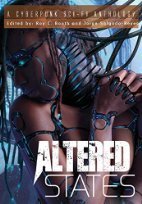
Tell us a bit about the book, who's in it and what's the idea behind it?
Jorge is a huge cyberpunk fan and knew I had written/edited the genre before, although I'm more of a traditional science fiction writer myself, so when we decided upon on an inaugural project, Altered States seemed to be the most logical choice. And we managed to get some very good writers, veteran and new alike, involved with the project such as CJ Cherryh, John Shirley, Paul Levinson, William F. Wu, R. Thomas Riley, and others.
This isn't your first anthology but is a first for Indie Authors Press -- did it present any new challenges?
Just the usual growing pains that come with the first major project of a new press and the fact that we were trying to coordinate all of this from two continents seeing as I'm in Minnesota and he's in Chile. For the most part, it's been a great arrangement with good results.
How did you go about choosing the contributors and/or stories?
We filled the book with half invites, half open submissions. We used our connections to get CJ Cherryh, John Shirley, William F. Wu, and Paul Levinson to contribute along with a few others. Beyond that, it was a question balancing older styles with new, and I think we succeeded with a nice complimentary in that regard.
You also write novels, plays and poems - what form do you prefer?
It comes and it goes, actually. Right now I'm on a solo horror short story kick, for example, but I can definitely tell that I want to get back on the stage soon and start working on a new play seeing as I just recently celebrated my 800th known confirmed production worldwide. I like to say that I have two Muses: One that keeps me on the straight and narrow with my prose and poetry, the other is my Mistress, the stage. Oh, she's fickle, demanding, and more than a bit of a tease, but when she's good, ohhh, she is sooo good... I need to get back to her and soon.
How do you feel about flash fiction?
I love writing it, especially drabbles, which, as you know, need to be exactly 100 words. Like writing for the stage, you really can't pad flash fiction. It all has to be precise and concise, a true economy of words and plotting that has to be tight and on the mark. Now, if it only paid the bills...
What do you think makes a good short story?
The ability to have you still thinking about it in a “positive” manner well after you've read it. The best stories, although entertaining, make us think and explore ideas (and emotions) we very well may not have experienced in any other way.
What are you working on at the moment? (apart from this interview of course)
I'm working on ten novels, solo and in collaboration, that range from 30K to 110K words in length already, from horror to science fiction/fantasy to mystery/suspense. There are the aforementioned horror stories that will soon give way to a series of cyberpunk shorts that I've been contracted for. I have a few more anthologies to edit. More script work, film and stage, and a whole bunch of other projects that I cannot discuss at the moment due to various nondisclosure agreements and the like.
You've worked with some of the most exciting names in SF&F is there anyone you've not yet worked with that you'd like to?
You know, I sort of just let that sort of thing happen, seems to work out better that way. I do a lot of conventions and a lot of panels and I am always doing one with someone I end up working with, like with Brian Keene and William F. Wu, both whom I've done plays with, for example. Both were Guests of Honor who shared some key panels with me. We'd get to talking afterward and next thing you know, we've got a project together. I'm already booked for seven conventions this year, who knows who'll ask me to work with them, or vice versa, after a panel or three?
Who are you currently working with that you think we need to be reading?
Axel Kohagen, my collaborator on the recently sold horror novel Orphans (Dark Fantasy Press) and a slew of other horror tales and novels we have in the works. His solo work is far darker and/or artsier than what I generally do, but he's dedicated to the craft and does his darndest to deliver.
In one sentence what is your best piece of advice for new writers?
Talking about writing is one thing, actually sitting down and doing it is quite another.
Published on February 26, 2015 01:28
February 25, 2015
North by Southwest writer John Hawkes-Reed guest post
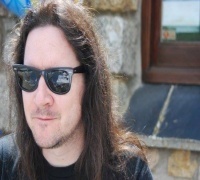
John Hawkes-Reed is a Unix hacker by day. By night, too, if it's been one of those sorts of weeks. His origin story involves finding the big yellow Gollancz hardbacks in Winchcome public library, the 'Making a transistor radio' Ladybird book and the John Peel programme. The 2006 Viable Paradise writer's workshop was something of a life-changing experience, and he has been quietly emitting stories of varying length since then. Some of those stories can be found in the anthologies 'Airship shape and Bristol fashion', 'Colinthology','Dark Spires' and 'Future Bristol'. He is fascinated by cold-war architecture, islands and stationary engines. John owns too many books, not enough tractors and is trivially Googleable.
John wrote Miss Butler and the Industrial Automation Group for the anthology and has dropped in to talk about ideas, amongst other things...
Summer 1983. Peelie plays the first release from Red Guitars, a band from Hull. 'Good Technology' becomes an indie hit, features in that year's Festive Fifty and is part of The Tube's guide to the Hull music scene. It seems obvious that it is only a matter of time before they're playing packed gigs at the Town & Country in Kentish Town. The song itself is a minimal piece. A mildly ironic list of post-spaceflight technological wonders. It is stripped back and carefully avoids any rockist cliche, as was the orthodoxy of the time.
[image error]In 1983 I'd fallen into work as a bench technician, repairing what we were then pleased to call 'personal computers' - Superbrain, Altos, AppleII, LoMac, Anadex, Qume, Televideo - all names completely meaningless to the people around me. It felt like I had my hands on some of the future that one would only see once a week on Tomorrow's World, and which otherwise was cheerfully avoiding rural Gloucestershire.
For that reason, and because it's a damn fine song, 'Good Technology' turned into something of a personal theme. I played it to death via mixtapes ruined by a variety of nasty car cassette players, and the lyrics - We've got computers that can find us friends/We know roughly when the world will end - stayed in the back of my head for the next thirty years.
[image error]
Winter 2015. Because I drive a car from the late 90s, if I want to listen to something other than the whistle of a turbocharger I have to go and find the pile of blank CDs that are gathering dust next to the selection of boot floppies and create an 'audio project'. I can almost hear the young people laughing into their Tumblergrams as I do it. One of the tracks is 'Good Technology'. I'm driving out of Kelston towards Bath when the carefully-digitised surface noise from an old 7" leads into a large helping of backwards guitar. Because I'm older and/or paying more attention to the road and/or just have a different brain, the lyrics first describe a quaint sort of retro-future where everyone will have smoked while worrying about impending nuclear war, then mutate into something quite different - We've got cigarettes that can tell us who we are/We've got missiles that reproduce a work of art - and each new mutation suggests a complete and functioning world brimming with odd stories.
[image error]People very rarely ask me where my ideas come from. Usually they say something like 'I have no idea what you just said, but it sounds amazing.' And then they change the subject.
The thing is that lone ideas are pretty weak sorts of thing. You couldn't in all good conscience stretch one idea out into a story. You'd get about half way and then there's be this nasty snap as some part broke off under the strain, which would leave you with nothing but a cut where the sharp bits sliced through the back of your hand. However, if you just quietly let the things arrive and fall into place like some wonky kind of Tetris, then you find that through a combination of piling, twisting and frantic jabbing, odd selections of ideas fall together with satisfiying 'bloink' noises. Or you could think of it as accelerating ideas to close to the speed of light, bashing them together and then carefully recording the subatomic story-particles that come spalling off the impact zone.
That is to say that creativity is a lot like playing Tetris in a particle accelerator.
[image error]
Another thing that people rarely say around me is 'Art or engineering?' because as a hacker who writes SF, the only sensible answer is 'Yes'.
Autumn 2006. I'm in the Island Inn on Martha's Vinyard, working my way through a case of expensive 'imported' beer (so Heineken, probably. Or Wifebeater.) while listening to Uncle Jim and TNH tell stories of fixing the dialogue in a story over ICQ. For reasons of dramatic wossname, but more likely because of the beer, everything went a bit wibbly and I was back in 1989 and reading about some Amiga demoscene crew who'd managed to crack the protection on some game or other by reading hex dumps over the phone to each other.
"You were debugging that story, live," I squeaked.
Everybody seemed quite pleased with that statement, although perhaps a bit 'Well, yes. Obviously…'. However I had to bag a fresh bottle and wander out onto the lawn so I could listen to the crickets and the surf and think about what had just clattered into place.
[image error]
Hacking on code was this thing I'd fallen into by accident - I'd happily assumed my future would be some sort of electronic engineering because this programming malarkey seemed to involve more maths than I could cope with, proper university and faffing about with coding sheets and flowcharts. Battering away at a keyboard in Turbo Pascal was just mucking about and would never lead to any sort of proper work, because I couldn't see how the type of complete impostor like me could ever actually manage to create the huge sorts of programs that actually did things and had input boxes, save-as icons and printer drivers. However, it was curiously satisfying work for which I had a pleasing aptitude.
I was lurching around the grounds of the Island Inn because I'd written a story over a period of many months and many, many cross-functional, cross-Atlantic team meetings (sit at the back and keep very still, the videoconferencing kit will assume you're furniture and ignore you) and sent it off to Viable Paradise more or less to find out what would happen next. I still couldn't see how anyone could hold the structure of a complete novel in their head. As far as I could tell it all went - (i) I can typing! (ii) Writery things! (iii) Profit!
And in a dimly recursive burst of self-awareness, I had realised that the bits of brain that lit up when I was writing code - the code that I originally couldn't see how to cobble together into useful programs that did things - were the same bits of brain that lit up when I was fumbling about with this other code. The code that you could run on human brains.
At this point I should tie this all up by pulling the obvious comparisons together for an emotionally satisfying conclusion. And, given that it's me writing this, there should probably be a self-deprecating geeky in-joke.
Alternatively I could just stop.
Published on February 25, 2015 07:37
February 24, 2015
North by Southwest writer Justin Newland - New Story

Justin Newland wrote the story Fisher of Men for North by Southwest and has written a new story exclusively for Bristol Book Blog in the run up to the release of the book. Justin can be found online here
The Hiding PlaceBy Justin Newland
I track her footprints through the forbidding forest to a tunnel at the base of a mountain. The cliff face is sheer, the rock ... black-red, volcanic. A pool of murky water to one side reflects the pale shimmer of a horned moon. I crouch in the undergrowth, watching, waiting. Dark blotches daubed around the tunnel entrance. Is that blood? To ward people away? Or keep them in? There are no guards at the entrance. I'll walk right in and free her. Someone or something has ripped her from the sanctity of her life. But who or what? And why was she taken? What's she done? What hasn’t she done? I scuttle towards the tunnel, pause at the entrance. Gloomy in there. Fear grips my throat. Limbs, heavy as teak. Won't be stopped now. Water dripping. Slippery underfoot. Back hard against the walls, I creep along the tunnel. Suddenly, there's movement - behind me. People, shouting, howling, screaming. "Help!" , "Save me!" the cries as thick as night. They're bringing more prisoners. I duck behind a rock, suck in my breath, clothes stick to me like leeches. Can they smell my fear? I hope it'll mingle with the terror of the captives. They're edging closer. I wait to hear the crack of a whip, the vicious use of a club. Nothing.They pass me by, shadows furtive on the wall. Their plaintive cries reverberate along the tunnel. I see no guards, but they must be there. I hear the chink of metal. They're chained together, one to another, a chain gang. I count fifteen. I let the sounds of terror fade before I move a muscle. I slink out from behind the rock, and meet a wall of rancid fear. It's palpable. Like sulphur, overwhelming. I gag. I stagger on, sour bile in my throat. Ahead, a faint glimmer of light, the end of the tunnel. I kneel, glance around the corner. It's an enormous cavern, lit by a dim, flickering torch light. I hear anguished cries. Chained to a huge circular rock in the middle of the cavern are legions of humans, young and old, male and female, rich and poor, vicious and virtuous, the do-gooders, the do-baders, and the do-nothingers. The Beast is there, sitting cross-legged atop the rock, oozing darkness from every pore. White goatee beard, horns jut from his forehead, long goat snout. Man body, tree-trunk thighs give way to hoofed feet. Holds the torch. A yew green slime drips off his putrescent skin, gathers in a slough below him, and coagulates into the rock on which he sits, arrogant, imperious. Soul-less eyes look towards me. I dive for cover. Has he seen me? My stomach twists. He crows, "I belong to you, I belong to you, I belong to you!" What's he talking about? He's demented. The new captives pull and yank on the chains that bind them to the face of the rock. "Escape is futile," he sneers. They say the Beast's a behemoth, older than sin, his ways, more subtle than the moon. Beneath his ever-watchful gaze, she's there somewhere, trapped, helpless. And there's only me. How to rescue her? Does he sleep? Is he human? No, he's not. Can't let that stop me. Can't leave her. Not now. Come too far. His litany continues, "You're here because you wanted to come. I didn't compel you." No. That's not true. That's another lie. He's born of lies. He lives in the unseen. He's cast a spell on them. Darting through the shadows, I move from rock to rock. I catch sight of her. She's there. Relief! I try and catch her attention, but she doesn't see me. Instead, she gazes ... right through me. I sneak up to her. Hands held fast to the rock by round chains of dull grey iron. She's pained, tortured. Momentarily, I faint from the stench of the decaying slough. I come round and whisper. "I can set you free, come with me." She ignores me. She doesn't even see me. She's in his spell, that's why, I convince myself. I must help. I grab a rock from the ground, and smash it against the iron ring, it rebounds off it. The retort echoes around the cavern, slowly recedes. Sweaty hands gripping the rock, I aim again. "Try!" I yell at her. "Pull the ring from the rock!" Her lips move. She's saying something. I can't hear what. "Loosen it," I cry. "Release yourself from this bondage!" She frowns. "I can't." "Why?" I look again at the iron ring and the placement of her hands. Then I realise. She's not chained at all. She's hanging on OF HER OWN FREE WILL! That's why - no guards at the entrance, on the chain gang, nor any enforcers in the cave. I'm bewildered. "You can leave at anytime. You're free. Just let go!" I urge her. "I ... don't want to!" She yells. "Don't ever try and release me! I'm staying here," She kicks me in the stomach, winding me. "I told you," the Beast growls. "I. Am. Their. Fear." He stubs out the torch, the light fades, shadows loom on the cavern walls. She needs help. I can do something good here. In the faint light, I grab her hand, pull her towards me, but she's holding on to the iron ring for dear life. She's got the strength of a man, a beast. She squeezes my hand, tearing the flesh. I yell.I can barely see her now. The torch is nearly extinguished. I can get her to let go. One last attempt. With my free hand, I reach above her and grasp her hand that's clutching the iron ring. If I can get her to loosen her grip, I can pull her away from the clutches of the Beast.
In the murky darkness, I miss her hand, and inadvertently grab the iron ring. My fingers close around it. I try and loosen them. My fingers won't move. I'm ... clinging to the ring! No! I'm ... chained ... to my own fears. I can't give them up either, otherwise I'd be empty, nothing, no-one.
Published on February 24, 2015 04:13
February 23, 2015
3 reviews
The Free by Will Vlautin
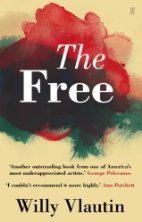
Leroy is an Iraq war veteran who, after a heartbreaking opening, lies in a coma, with a Sci-Fi story running through his head. Pauline is one of his nurses, who has to look after her father when she’s not at work. Freddie is the night-watchman at the care home that Leroy is in at the beginning of the story, he also works a day job as he is struggling to pay the medical bills for his sick daughter. This book is an indictment against the United States medical system, forcing people into impoverished, desperate lives. It made me very glad that we, in Britain, have the National Health Service, despite all its problems. And incredibly nervous about the fact that successive neoliberal governments here have pushed us closer and closer to the American system. Other folk have expressed that there is hope in this book, and to some extent there is, but the small glimmerings of hope do little to offset the often harrowing lives the book’s characters lead. The fact that they are unremarkable in their desperation is why the hope does little to alleviate things, there is a commonality to their suffering, lack of adequate medical insurance and jobs that don’t pay living wages. All too common situations.
"...the moral test of government is how that government treats those who are in the dawn of life, the children; those who are in the twilight of life, the elderly; those who are in the shadows of life; the sick, the needy and the handicapped. " ~ Last Speech of Hubert H. Humphrey
Overall - Excellent, but depressing.
The Enchanted by Rene Denfield
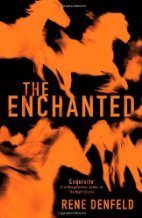
he look in her eyes is of a person who drank from the end of a gun barrel and found it delicious. Her eyes are filled with a strange sort of wondrous sadness, as if marvelling at all the beauty and pain in the world.
A poetic, magic realist book about Death Row? Well yes, a stunningly beautiful read. Denfield herself is a Death Row investigator, and this book obviously draws upon that. The book is set within a maximum security prison, where the prisoners awaiting execution are placed in the dungeon. They wait, often for many years, for the appeals procedure to be exhausted. The Lady delves into the history of the men who are on Death Row, looking to save them from execution. The Fallen Priest offers succour to them. The Warden wonders why people can object to retributive death but not to death by cancer, as he watches his wife suffer the indignities of terminal illness. The twilight world of the institution is narrated by a nameless prisoner, exposing thoughtless corruption, daily prisoner rape, the prison as enchanted place with little men hammering in the walls and golden horses racing underground. This is an exploration of the psychology of crime versus human decency, where beauty and hope contend with horror and despair.
Overall – Beautiful prose, heart rending subject
The Sense of Style by Stephen Pinker
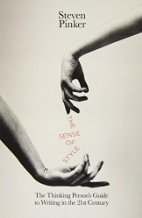
The use of consistent grammar reassures a reader that the writer has exercised care in constructing his prose, which in turn increases her confidence that he has exercised care in the research and thinking behind the prose. It is also an act of courtesy.
Pinker is a cognitive psychologist who has written several books about language. His starting position with this book is that, in being a student of language, he is an enthusiastic reader of style guides. However many style guides are stuck in the past, hence the sub-heading for this book The Thinking Person's Guide to Writing in the 21st Century and so he sets out to correct this. The book is aimed mainly at the non-fiction writer, the academic, the essayist, the popular science writer but does have a wealth of good advice for any writer. The book is oddly structured, three short chapters which feel a little like an extended throat clearing, an extended stream of consciousness about several examples of good writing, and a very good exploration of the curse of knowledge (the fact that academics and scientists should assume that their audience is as smart as them, but maybe not familiar with the subject). There then follow three long chapters – one on sentence trees, that I must confess meant very little to me, a visual way of breaking sentences down into Object, subject, preposition etc, which all seemed a little overly technical and also to break the rules Pinker set down in the previous chapter on the curse of knowledge. The next chapter was better, being an examination of coherence, what every writer should aspire to, that the next three levels of writing, paragraphs, chapters and whole books should work towards a coherent vision. The last chapter examines many rules of grammar in the light of an intellectual war between prescriptivists, that there is an objective right and wrong in the way language is used versus the descriptivists, that language is organic and rules should reflect its actual use. He argues intelligently on behalf of the descriptive approach and demolishes some grammar myths like split infinitves and the use of that and which. This last section is a useful go to reference for any writer.
Overall – A little bit more dry and technical than is necessary, which is ironic as he is arguing that writers should use the classic style to eliminate overly technical and dry prose.

Leroy is an Iraq war veteran who, after a heartbreaking opening, lies in a coma, with a Sci-Fi story running through his head. Pauline is one of his nurses, who has to look after her father when she’s not at work. Freddie is the night-watchman at the care home that Leroy is in at the beginning of the story, he also works a day job as he is struggling to pay the medical bills for his sick daughter. This book is an indictment against the United States medical system, forcing people into impoverished, desperate lives. It made me very glad that we, in Britain, have the National Health Service, despite all its problems. And incredibly nervous about the fact that successive neoliberal governments here have pushed us closer and closer to the American system. Other folk have expressed that there is hope in this book, and to some extent there is, but the small glimmerings of hope do little to offset the often harrowing lives the book’s characters lead. The fact that they are unremarkable in their desperation is why the hope does little to alleviate things, there is a commonality to their suffering, lack of adequate medical insurance and jobs that don’t pay living wages. All too common situations.
"...the moral test of government is how that government treats those who are in the dawn of life, the children; those who are in the twilight of life, the elderly; those who are in the shadows of life; the sick, the needy and the handicapped. " ~ Last Speech of Hubert H. Humphrey
Overall - Excellent, but depressing.
The Enchanted by Rene Denfield

he look in her eyes is of a person who drank from the end of a gun barrel and found it delicious. Her eyes are filled with a strange sort of wondrous sadness, as if marvelling at all the beauty and pain in the world.
A poetic, magic realist book about Death Row? Well yes, a stunningly beautiful read. Denfield herself is a Death Row investigator, and this book obviously draws upon that. The book is set within a maximum security prison, where the prisoners awaiting execution are placed in the dungeon. They wait, often for many years, for the appeals procedure to be exhausted. The Lady delves into the history of the men who are on Death Row, looking to save them from execution. The Fallen Priest offers succour to them. The Warden wonders why people can object to retributive death but not to death by cancer, as he watches his wife suffer the indignities of terminal illness. The twilight world of the institution is narrated by a nameless prisoner, exposing thoughtless corruption, daily prisoner rape, the prison as enchanted place with little men hammering in the walls and golden horses racing underground. This is an exploration of the psychology of crime versus human decency, where beauty and hope contend with horror and despair.
Overall – Beautiful prose, heart rending subject
The Sense of Style by Stephen Pinker

The use of consistent grammar reassures a reader that the writer has exercised care in constructing his prose, which in turn increases her confidence that he has exercised care in the research and thinking behind the prose. It is also an act of courtesy.
Pinker is a cognitive psychologist who has written several books about language. His starting position with this book is that, in being a student of language, he is an enthusiastic reader of style guides. However many style guides are stuck in the past, hence the sub-heading for this book The Thinking Person's Guide to Writing in the 21st Century and so he sets out to correct this. The book is aimed mainly at the non-fiction writer, the academic, the essayist, the popular science writer but does have a wealth of good advice for any writer. The book is oddly structured, three short chapters which feel a little like an extended throat clearing, an extended stream of consciousness about several examples of good writing, and a very good exploration of the curse of knowledge (the fact that academics and scientists should assume that their audience is as smart as them, but maybe not familiar with the subject). There then follow three long chapters – one on sentence trees, that I must confess meant very little to me, a visual way of breaking sentences down into Object, subject, preposition etc, which all seemed a little overly technical and also to break the rules Pinker set down in the previous chapter on the curse of knowledge. The next chapter was better, being an examination of coherence, what every writer should aspire to, that the next three levels of writing, paragraphs, chapters and whole books should work towards a coherent vision. The last chapter examines many rules of grammar in the light of an intellectual war between prescriptivists, that there is an objective right and wrong in the way language is used versus the descriptivists, that language is organic and rules should reflect its actual use. He argues intelligently on behalf of the descriptive approach and demolishes some grammar myths like split infinitves and the use of that and which. This last section is a useful go to reference for any writer.
Overall – A little bit more dry and technical than is necessary, which is ironic as he is arguing that writers should use the classic style to eliminate overly technical and dry prose.
Published on February 23, 2015 03:42
Guest post from Ekta R Garg - Writing about relationships

Since the start of her publishing career in 2005 Ekta has edited and written about everything from health care to home improvement to Hindi films. She has worked for: The Portland Physician Scribe, Portland, Oregon's premier medical newspaper; show magazines for home tours organized by the Portland Home Builders Association; ABCDlady.com; The Bollywood Ticket; The International Indian; and the annual anthologies published by the Avondale Inkslingers, based in Avondale, Arizona.
In 2011 Ekta stepped off the ledge and became a freelancer. She edits short stories and novels for other writers, contributing to their writing dreams. She is also a part-time editor for aois21, and she reviews books for her own book review blog as well as NetGalley, TypeReel, and Bookpleasures.com.
Prairie Sky Publishing(prairieskypublishing.com) serves as the publishing arm of Ekta's professional writing blog, The Write Edge (thewriteedge.wordpress.com). When she's not writing, Ekta is a domestic engineer--known in the vernacular as "a housewife." She's married, has two energetic daughters who keep her running, and she divides her time between keeping house and fulfilling her writing dreams.
Social Media links:
Blog: The Write Edge, thewriteedge.wordpress.comTwitter: @EktaRGargGoodreads: Goodreads: https://www.goodreads.com/book/show/2... Author Page: https://www.amazon.com/author/ektargarg
Two for the Heart: Stories in Pairs, Set 1 available for your Kindle on Amazon at:http://www.amazon.com/dp/B00RTV272M
Two for the Heart: Stories in Pairs, Set 1 available for your iPad, Nook, Kobo, or other ereader at:https://www.smashwords.com/books/view...
Ekta has stopped by to talk about writing about relationships
Writing About Relationships: Three Tips
By Ekta R. Garg
These days in my writing I’m spending a lot of time thinking about relationships. My brand new series, “Stories in Pairs,” by design examines relationships in every possible way—between characters and locations; between ideas and situations. Between me and the reader.
[image error]
The main thrust behind the series comes in the fact that everyone has a story to tell, and our stories intersect with other people’s stories all the time. We don’t know when or where those intersections will happen or how much they will mean to those we meet.
The hardest-working writers examine the world around them, which includes relationships. I have three tips to help you write about those life-changing intersections.
1. Write without fear. Don’t let your real-life relationships override the relationships you create in fiction. In 2009 I read an author interview in which the author advised, “Write as if your parents were dead.” The words shocked me. I grew up in a close-knit family, and I had always lived by the principles and values my parents taught.
Those principles and values offered me a solid foundation for life; however, they also made me think twice about possible stories. I worried that by tackling certain ideas my parents would get the mistaken impression I had eschewed their teachings. I also wondered what former teachers and classmates from my conservative private school would think if I wrote about “taboo” topics.
Truth to tell, the advice also scared me. What would it mean to write freely? Unfettered? To deal with ideas and thoughts I’d never allowed myself to consider in my writing?
That author interview changed my life. I spent a few days thinking about the author’s advice, allowing it to occupy space in my mind and heart. After those few days I realized that just as I valued the relationships I had with my parents and others, I also had to value the relationship I had with my writing.
I gained my freedom from everything that held me back before. In the years since reading that interview I’ve produced (after several drafts!) some of the best writing I’ve ever done. Sure, I can attribute some of that to sheer life experience. But I know that most of it comes from giving myself permission to tackle topics, characters and stories that would have frightened me before 2009.
2. Take what you know and expand on it. Writers often receive the conventional piece of advice “Write what you know”. Well, yes and no.
In college I wrote a novel. When I shared the manuscript with my mother, she read a few chapters and then stopped. I asked her what she thought of it; she told me she felt like she was reading about our family’s daily routines.
She was right. I’d simply taken our family, changed their names (and added an extra sibling,) and presented the fictional family as the protagonists of my book. I should have taken grains of my family and planted them in brand new soil to allow a new group of people to grow.
Should writers take inspiration from real-life people? Absolutely! Just don’t take Great Aunt Sally and replicate her wart for wart on the page. Stephen King points out in his book On Writing that most people lead fairly mundane lives, writers included. We all do laundry and wash dishes and drop kids off at school and pay our bills.
Readers don’t want to read about characters who do those things. Readers come to books for the unusual. The fantastic. The mystical, the magical, the exhilarating, the scary, the horrifying. Not for characters whose biggest concern is making sure they file their taxes on time.
Take what you know and elevate it. Add quirky habits; give your characters oddities. Pick a city you’ve never visited, do lots of research on it (actual research, not just reading Wikipedia,) and set your story there. Find out about a profession you know nothing about and give that profession to one of your main characters.
Part of the challenge and thrill of writing comes in starting with what you know and playing that age-old game “What if”. Play it all the time. Play it at every single change in the story. Your characters will surprise you, guaranteed.
3. Try new relationship combinations. In my first release this month, Two for the Heart, I wrote two short stories about the power of love and relationships. The second story called “Remembrance” deals with a pair of estranged sisters. One of them endures an emergency, and because of the situation the sisters must face one another and deal with their grievances.
When I started the first draft of this story, however, I wrote about a mother-in-law and her son-in-law. I chose this combination because we don’t often see a story about people in these relationships. Their dynamic intrigued me; I wanted to use the woman’s daughter—the wife of the man—as the unifying factor and the turning point of the story.
I eventually changed the characters to two sisters, but I still intend to write a story in the future about my original character combination. I feel like dealing with the texture and the depth of in-laws could provide me with rich material in another story.
When you consider a new story idea, think about the relationships of your characters. Pick two or three characters who either normally wouldn’t interact or else who you haven’t read about in stories or books. Often a new combination will bring surprises in dialogue and story situations, which can only strengthen your writing.
Published on February 23, 2015 00:49
February 21, 2015
Guns of the Dawn - review & interview with the author
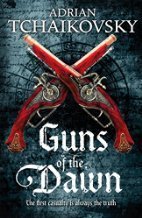
If you look Adrian Tchaikovsky up on Wikipedia it says - "Adrian Czajkowski is a British fantasy author. His best known work is the Shadows of the Apt series. Tor Books has announced it would publish a new science fiction book by Tchaikovsky after Shadows of the Apt has finished." Guns of the Dawn is that book.
The Bristol Book Blog has been lucky to get an advanced copy of the book and an interview with the author. The book is now launched and available from all good book shops.
Interview with the author:
Many thanks for talking to us Adrian, here's ten questions about the book -
1 - In the publicity I saw this quote –
‘There is only one book – specifically conceived and started as a book – which has never let go of me, and has shadowed me all the way to the present day. It is Emily Marshwic’s book, the story of her war for her king, her country and her truth, however hard to reconcile those may be. I am happier than I can say that, after all her perseverance (a character trait that appears to have preceded her actual realisation as a character), she is finally seeing the light of day.’ Adrian Tchaikovsky
How long have you been writing this book in your head? How long did it take to get to first draft?
I can’t remember the exact date but I made my first start on it (a shot at what is now the beginning of chapter 2) way before Empire ever came out – some time maybe mid-90’s? I went back to it right before starting on Shadows of the Apt and produced a very rough first draft, that’s seen a lot of rewriting since. This really is the one idea that hasn’t let go of me, though.
2 - Some people are saying its Napoleonic, others that the war feels like the Crimean, did you base it (even loosely) on any particular conflict? (I think there are elements of Vietnam & WW1 in it too?)
Oh well, when I borrow from history I do it by the handful. Although the setting is regency, the battlefield Emily gets is very Vietnam-y, and the politics has a bit of English Civil War (and indeed US Civil War) and a bit of US War of Independence to it. Hadn’t intentionally gone for Crimea, and certainly not for WWI (I kind of did my fantastical take on that with Shadows of the Apt). There’s certainly more of the early 18th century England to it than anything else.
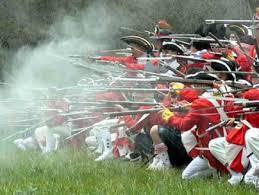
3 – What did you learn about writing by writing this book?
There are some big differences between Guns and Shadows of the Apt, but not necessarily the ones you’d think. Yes, Guns has less of the overtly fantastical to it, but that’s not something, I think, that shapes the structure or tone of the book particularly. What is important is that Guns follows one character’s POV throughout – we only ever see the world through Emily Marshwic’s eyes. That automatically gives you a tighter focus – less world-spanning wars and politics, more individual survival, honour and experience. It’s a more character-focused book for that.
4 – This is a very well-crafted book, plot wise and every character feels necessary and important. Do you do a lot of pre-planning?
Thank you, and yes. I plan a lot before I write. I generally have a chapter by chapter breakdown, and often scenes within chapters, and sometimes even beats within scenes – particularly with important conversations or complex action sequences. Certainly sometimes I need to rejig things at every level, but having that framework helps me pace and structure the book at the outset.
5 – This is a standalone – would you ever be tempted to revisit the characters and the world again in shorts or sequels?
Certainly. There’s actually a pretty cool sequel idea that came to me when I was discussing the book at a party a while back that’s taken root and grown since. It’s something I’d love to have the opportunity to do, if I feel there’s an audience for it.
6 – It’s a minor spoiler but including rape in a novel seems to be a fraught issue, how did you approach this?
Very, very carefully. There are so many bad/insensitive ways to use the concept – often as a throwaway to make your villain more villainous, for example – that are wholly unnecessary. Yes, it’s a thing that happens, and with women joining a formerly men-only army, the spectre of it was always going to be there. But at the same time it’s a real thing in the real world that happens to real people with appalling frequency. I genuinely hope that I haven’t caused any distress or harm with the way I’ve approached the subject. I’ve had that very much in mind when writing. And if I have misjudged, then I am truly sorry.
7 – A lot of people are comparing the first section to Austen, is any similarity conscious?
The setting of domestic Lascanne is intentionally Austenian – although under greater wartime privation than the world she was drawing on. Emily is the middle of three sisters, and her bureaucratic nemesis Mr Northway is very much a Mr Collins homage. Austen is a literary institution: she wasn’t alone in revolutionising literature in her day, but she is deservedly seen as one of our great literary giants. In writing not only a fantasy Napoleonic, but also a fantasy Austen pastiche, I hope it’s seen more as homage than petty larceny.
8 – Where there any specific challenges with this book that you’ve not encountered in previous books & if so how did you overcome them?
I’ve mentioned narrowing the view to a single character, which deprives me of my usual head-hopping to give you all sides of the picture. In Shadows of the Apt it was always good to know I could pop into the Wasp commander’s head to show you how he was thinking. Here, I, Emily and the reader all have to try and work out what’s going on from the same limited set of facts. The book also has a three-act structure that my others haven’t had – possibly because it’s so much more of a stand alone. I did wrestle with the first section (pre-war) quite a bit – it had to be a contrast to the brutalities of the fighting, but at the same time it needed to keep moving.
9 – Did you do much research before writing this novel? If so what on?
I tend to build up a head of knowledge on a setting or a subject, which then manifests as a plot idea – hence a lot of “research” happens ahead of time. With fantasy, too, I am generally writing in a secondary world precisely so various details are under my control that wouldn’t if I was writing in a historical setting. Even alt-histories have a large research burden, because you need to make the ramifications of your changes believable. Guns stands a step further from the real timeline than that, so once I had the feel and basics of the setting in mind, I had a fair amount of freedom with the rest. Recently I’ve written a few pieces set in the very near future (such as the novella The Bloody Delugethat was in Abaddon’s ‘Journal of the Plague Year’. With that sort of thing, very definitely set in an identifiable real world, I found myself doing far more research on all sorts of odd things.
10 – Were you nervous or excited (or both) to be working on a book that wasn’t part of the Shadows of the Apt series?
Both, and still am. You bed down with a series – it has a following who will probably buy the next book, so you can get comfortable with it. I’ve had ten books and 6 years like that, and now I’m out on my own in the wilderness again, hoping that at least some of those readers are going to come and find me. It’s terrifying, but it’s also exhilarating to be able to tell some of the stories I’ve had bubbling away in my head that wouldn’t work for the kinden.
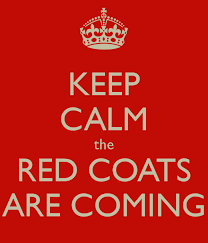 ----------
----------Bristol Book Blog Review:
Emily Marchwic, middle sister of a noble family, lives in Lascanne who are pursuing a bitter war against their neighbour Denland. The war was started when the Denlanders committed regicide and instituted a republic, a direct danger to Lascanne's monarchy. The war has emptied the country of men, Emily's brother and brother-in-law being part of the draft and the sisters try to get on with their life in a country where the old and young and the women are the only ones immune to the draft. Due to family history the Marshwics consider the local governor, a Mr Northway, as an enemy.
The first third of the book builds a very clear picture of what the country is like without men, with scarcity, the impact of brigands and the very human desire to carry on as if everything were normal. This part of the book is well observed. Emily and her younger sister attend a ball held by the king, and get to meet Giles Scavian, a warlock. The warlocks are key to the war. There is an immediate attraction between them but Scavian must leave for the front.
Then comes the news that more soldiers are needed and that the draft requires one woman from each household and it is obvious that Emily must go to war. The war is being fought on two main fronts, the Couchant and the Levant. The new recruits all wish to go to the Couchant for it's wide open plains favour the glorious cavalry of Lascanne but Emily is sent to the Levant, a swamp requiring jungle warfare.
This middle section has a healthy mix of exciting warfare, weary cynicism and a battle for the soul of Emily between the dashing warlock Scavian and the difficult Mr Northway with whom she has an illicit exchange of letters.
As things get worse Emily begins to have doubts about the cause, he country and her enemy and she is thrust into a position to make decisions that will affect everything.
Tchaikovsky has built a world that is supremely focused, with only hints of the wider world outside the story, a function of the close POV. The small hints of a swamp civilization and the wider world left me wanting more. The story itself is well made, I was impressed with Tchaikovsky's storytelling abilities and his command of the reader's emotions. This is a big book but doesn't read like one, it propels you forward effortlessly. I enjoyed the middle section the best, the brilliant survivor's club, the creeping claustrophobia of the swamp, the slow revelations. But the ending was also very satisfying too..
Overall - Large but very readable book, if you ever wondered what it'd be like for one of Austen's heroines to go to war then this is the book for you!
Published on February 21, 2015 03:38
February 20, 2015
Three reviews
The best American nonrequired reading 2014
edited by Daniel Handler
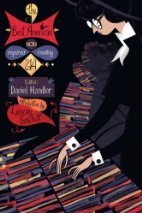
These pieces of fiction, a couple of graphic art pieces and non-fiction are chosen by a group of high school students and as such are highly eclectic with no underlying theme. It’s a very mixed bag, some pieces I dropped after a few paragraphs, some pieces I followed up with finding out more about the author as someone to read more from. It’s hard to choose any outstanding ones, the man who saves you from yourself and a non-fiction piece by a journalist who undertook to experience illegal immigration from the immigrants perspective are memorable. However there were, for me, just as many unappealing pieces as there were appealing and being such an eclectic mix it all felt a little arbitrary, hence the “Average” rating. However I think this is probably the books strength as well, as probably most readers would find something of interest to them in the pages.
Overall – Hit & Miss
The Moth edited by Catherine Burns
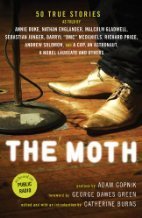
The Moth is a storytelling event, aiming to take folk back to a time before TV and radio, before mass market paperbacks, back to a time when people would gather on their porch and tell tales. The Moth refers to the moths that would fly around the lights, on said porches, when the storyteller was doing their thing. More details of the Moth can be seen on its website - http://themoth.org/ This book collects 50 of the best stories. As with all anthologies it’s a mixed bag, and these are transcribed stories, meant to be experienced out loud, so a bit odd to read occasionally. However saying that the quality is very high and there are a great many very interesting and entertaining stories within. There is a huge range from comic to tragic and since all the stories are true the tragic ones really are tragic. This is a worthwhile collection I dipped into over a period of weeks, which I think is probably the best way to approach it.
Overall – Storytelling needs an audience but this is a good selection of reading material
Screenwriting 101 by Film Crit Hulk
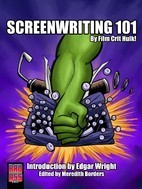
If you’re not familiar with Film Crit Hulk you should head on over to his website as he’s one of the most insightful film critics out there - https://filmcrithulk.wordpress.com/ and now he’s written a book. Hulk works in Hollywood and has written a great many scripts himself and has a deep understanding of cinema. This book is a screenwriting masterclass but along the way you’ll get a great grounding in what makes a good story. Hulk demolishes the three act structure and the heroes journey and sets up alternatives that make a lot more sense. Throughout are examples from films good and bad. Want to know why Cowboys and Aliens was a poor movie? Hulk explains it so that you’ll find yourself nodding and thinking “oh yeah, of course”. If you’re interested in film, and don’t necessarily want to be a scriptwriter, there is a lot in here for you anyway, if you are a writer of any format then there’s a lot in here for you and if you are an aspiring scriptwriter this should be essential reading.
Overall – Hulk is one of those smart people you read and wish to be like.

These pieces of fiction, a couple of graphic art pieces and non-fiction are chosen by a group of high school students and as such are highly eclectic with no underlying theme. It’s a very mixed bag, some pieces I dropped after a few paragraphs, some pieces I followed up with finding out more about the author as someone to read more from. It’s hard to choose any outstanding ones, the man who saves you from yourself and a non-fiction piece by a journalist who undertook to experience illegal immigration from the immigrants perspective are memorable. However there were, for me, just as many unappealing pieces as there were appealing and being such an eclectic mix it all felt a little arbitrary, hence the “Average” rating. However I think this is probably the books strength as well, as probably most readers would find something of interest to them in the pages.
Overall – Hit & Miss
The Moth edited by Catherine Burns

The Moth is a storytelling event, aiming to take folk back to a time before TV and radio, before mass market paperbacks, back to a time when people would gather on their porch and tell tales. The Moth refers to the moths that would fly around the lights, on said porches, when the storyteller was doing their thing. More details of the Moth can be seen on its website - http://themoth.org/ This book collects 50 of the best stories. As with all anthologies it’s a mixed bag, and these are transcribed stories, meant to be experienced out loud, so a bit odd to read occasionally. However saying that the quality is very high and there are a great many very interesting and entertaining stories within. There is a huge range from comic to tragic and since all the stories are true the tragic ones really are tragic. This is a worthwhile collection I dipped into over a period of weeks, which I think is probably the best way to approach it.
Overall – Storytelling needs an audience but this is a good selection of reading material
Screenwriting 101 by Film Crit Hulk

If you’re not familiar with Film Crit Hulk you should head on over to his website as he’s one of the most insightful film critics out there - https://filmcrithulk.wordpress.com/ and now he’s written a book. Hulk works in Hollywood and has written a great many scripts himself and has a deep understanding of cinema. This book is a screenwriting masterclass but along the way you’ll get a great grounding in what makes a good story. Hulk demolishes the three act structure and the heroes journey and sets up alternatives that make a lot more sense. Throughout are examples from films good and bad. Want to know why Cowboys and Aliens was a poor movie? Hulk explains it so that you’ll find yourself nodding and thinking “oh yeah, of course”. If you’re interested in film, and don’t necessarily want to be a scriptwriter, there is a lot in here for you anyway, if you are a writer of any format then there’s a lot in here for you and if you are an aspiring scriptwriter this should be essential reading.
Overall – Hulk is one of those smart people you read and wish to be like.
Published on February 20, 2015 01:41
Pete Sutton's Blog
- Pete Sutton's profile
- 14 followers
Pete Sutton isn't a Goodreads Author
(yet),
but they
do have a blog,
so here are some recent posts imported from
their feed.



